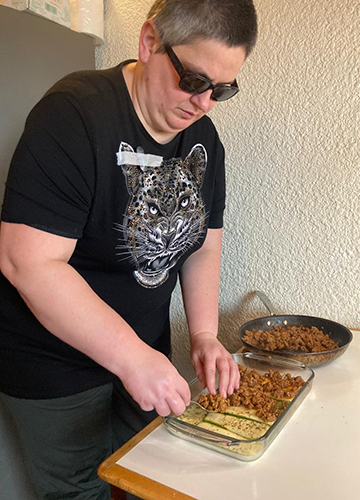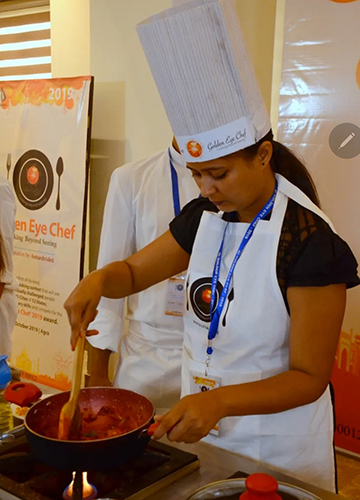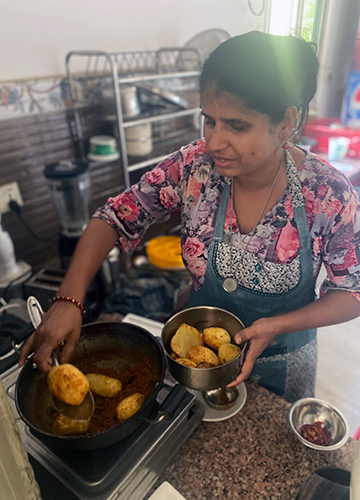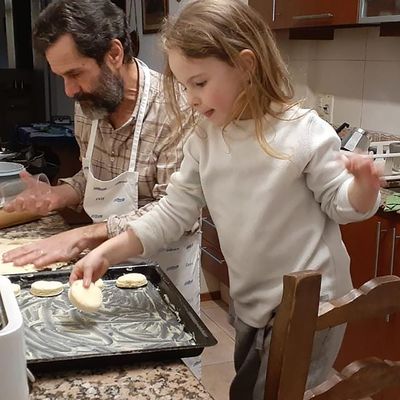Esref Armagan was born blind, but boy can he ‘see’!
Born in 1953 into an impoverished family in Istanbul, Armagan paints, in colours, shapes and shades. His art―rarely abstract, mostly landscape―has astounded many, particularly because his paintings have the right scale and perspective. He has even been the subject of a 2008 study by the University of Toronto and Harvard University. Researchers monitored his brain and found his visual cortex lighting up as he sketched, just as it does for people with sight. Armagan and his art challenge our ideas about colour and understanding of sight. It took him decades of work and perseverance to master the method of using his fingertips and mind as visual aids. And yet, some critics have discredited his work―exhibited in Turkey, the Netherlands and the Czech Republic―as not his own. Armagan’s amazing ability has been often dwarfed by his disability. And, he is not alone.
Participants of Golden Eye Chef 2023, an annual cooking contest for the blind since 2019, know what it means to have your identity distilled down to your disability. “When we held the competition in 2019, we went live on YouTube, and one of the first comments we received was ‘even they feel the need to cook now? They are blind, how do they even eat?’” recalls Akhil Srivastava, managing trustee of NGO Antardrishti and the brain behind the competition. “People do not know what they are capable of. We realised that more than motivating blind people, we need to create awareness among the sighted.”
The 2019 event was held in Agra, where Srivastava is based, and was restricted to participants in India. In 2020, the pandemic struck and the competition went online―participants were asked to send videos of them cooking a dish, and were judged on parameters like how well the recipe went with the theme of the competition, how accessible the kitchen was, how the participants had arranged the ingredients and how skilful they were, says chef V.K. Iyer, who has been part of the jury for the last three editions. In 2022, the contest went international, with five overseas participants sending in videos. Last year, there were 32 participants, 11 of whom were from countries like the US, Uruguay, Mauritius and North Macedonia. Unfortunately, prejudice knows no borders.
Poland-born, Mexico-based Katarzyna Agnieszka Bukowska, 46, would know. The former languages teacher (Polish, English and German) has been asked some very inane questions―how do you brush your teeth? Why get married when you cannot see your husband? That is why she started her own YouTube channel “to try to overcome this kind of prejudice”.
Bukowska won the jury award for best recipe among the totally blind. She was born with visual impairment, but could read with help of glasses. “As a teenager, I developed glaucoma,” she says, “and then as an adult, I lost sight completely.” Keeping with the theme of the 2023 contest―traditional recipe with locally sourced ingredients―she made green salsa chicken tamales, a Mexican dish.
Bukowska has been living in Mexico for 18 years with her husband, Juan, who helped record the video, dog Imbir (meaning ginger in Polish), and cat Nebbiolo, named so after the Italian wine. Around the time she was finishing her master’s in English philology, with specialisation in cognitive linguistics, she wanted to move out of the family home in Mlawa, Poland, and was wondering what to do and where to go next. “Around that time, I was Skyping a lot with people and that is how I met my husband,” she recalls. “After finishing my master’s thesis, I felt like I needed some kind of reward and went to Mexico on vacation.” Mexico was warm and welcoming, and she just stayed put.
Bukowska’s love for cooking comes from her mother. As a child, she went to boarding school, but would visit home on weekends, most of which were spent observing her mother whip up a yummy cake with just some flour, eggs and butter. “I thought, ‘This is magic’,” she says. She baked her first cake when she was 11 under her mother’s supervision and has not looked back since.
If cooking is magical for Bukowska, it is an adventure for Daniel Aronoff, 44. He won the people’s choice award for best recipe and was the second runner-up in the jury award for the same among the totally blind. He lost his eyes to a tumour around the optic nerve, which first showed up when he was all of three.
As far as he can remember, Aronoff has always loved cooking. He wanted to be a chef when he was 20, but admits that he did not have the skills for it then. “It has taken years of trial and error,” says Aronoff, who had a website, called the Blind Taste Test, where he would post restaurant reviews. “My wife [Ania] is from the Basque Country in Spain, I am from New York. Just having that relationship, learning about new food, it inspired me to do more―to try different cuisines, do more cooking of my own.”
Ania, adds Aronoff, has been a constant source of inspiration. It was Ania who encouraged him to participate in the contest, even as he was following its social media handle and retweeting its posts. And his dish―hake (a local fish in Basque Country) in green sauce (made from parsley) reflects his admiration and gratitude for his wife. Aronoff met Ania online in 2011. “She had questions about cupcakes in America and places to eat in New York,” says Aronoff, who has a double master’s degree in social work and visual rehabilitation therapy. “And then we met the next year in person and got married two years later.” They have a four-year-old son, Mikel.
Aronoff, who now lives in Basque Country with his wife and son, finds it frustrating when someone asks who cooks for him. “Excuse me? I have a million gadgets in my kitchen. I use my stove with my iPhone. I have talking thermometers,” says Aronoff, who now teaches English online. He says he cannot understand why people think blind people cannot cook when there are so many good cooks like Christine Ha, the first-ever blind person to win the MasterChef title. “Obviously, taste is very important to us,” he says. “It is one of those senses that we use a lot. With our four senses we do what you can with five.” It might take them some time, some different trials, different alternative techniques, he says, but they can do what they set their mind to.
Aronoff’s parents are chuffed about their son’s cooking skills. “They actually exaggerate to their friends,” says Aronoff, laughing. “They say, ‘Our son is doing gourmet things in the kitchen.’ And I am like, I am making a piece of fish; it is not gourmet.”
Not all parents are as encouraging though, at least not initially. Annpurna Kaur, 28, was 13 when she first made a dish on her own. Her parents and sisters were away when she made aloo ki sabzi (a side dish made of potatoes). The dish turned out okay, but she got an earful for cooking when there was no one at home. “But slowly my father supported me,” says Kaur, who won the jury award for best recipe among the partially blind. “Whenever he would cook, he would make me sit next to him.”
Kaur was born with visual impairment and underwent a surgery at three that gave her partial vision. She made vegetarian momos, her speciality, for the competition. She has her own restaurant called Krafty Momos near Delhi University’s north campus. She never saw cooking as a challenge, she says. “Initially, it took me time to distinguish between the masalas, but I figured it out,” she says. “It was more difficult to convince my parents and society.”
The reluctance to let visually challenged people cook or do just about anything on their own largely stems from safety concerns. Navina Gyawali, 33, from Kathmandu was often dissuaded from cooking for fear of sustaining burns or injuries. “I then asked my family, ‘You can also get burns, right? How is it any different from when I get them? I get burns not because I am blind, but because I am not mindful,” says Gyawali, who was born blind. “I need to cook to survive, right?”
Her family finally saw reason in her argument. Today, when there is a puja at her house, it is a given that she will make the pickles and side dishes. Her cooking skills improved when she went to the US to study international relations and US history at the University of Southern Indiana on a Fulbright scholarship. She was living alone there and missing Nepali food, so she got cooking. Convincing her family that she can cook and also teaching her blind husband to cook have been her biggest achievements, says Gyawali.
For the Golden Eye Chef, she made dhido (black millet porridge) and gundruk (fermented leafy vegetable). But what probably got her the jury award for the most creative recipe among the totally blind was the effort she put in to make it as traditional as possible. Dhido and gundruk were staples almost a century ago when people did not have enough to eat, says Gyawali. She not only dressed like a woman of that time but also travelled 300km to cook in a mud house with a chulha (earthen stove). That is why, she says, she was expecting an award for her creativity.
But David Bogacz, 66, from Montevideo, Uruguay, was not even sure he would participate in the contest. He always loved cooking but never had a chance to learn it. Last March, the now retired neurophysiologist began taking cooking classes, and it was his teacher there who pushed him to participate. “My family (wife Mariella, a psychologist and theatre actor, and two sons) was surprised with my decision to participate,” he says. “They were very happy when I won [the jury award for most creative recipe and the people’s choice award in best recipe among the partially blind]. They are happy not just for the prize but for the fact that I am able to accept the challenge.”
Bogacz, who makes a mean pizza that he learnt from his mother, made Kenny’s Lamb for the competition. “I wanted to cook something that was relatively new, with some ingredients that were typical to my country. I discussed it with my friend Kenny, who is a good cook but not a professional,” says Bogacz, who developed vision problems in 2001. In 2009, he lost vision in the right eye and then began to have problems in the left eye, too.
Bogacz wants to continue cooking and try his hand at making Indian dishes, as do Bukowska and Aronoff. Bukowska is hoping she can travel to India this year as the competition may have an offline edition. Aronoff is a huge Julia Child fan and is exploring French cuisine through her shows, videos and books. Kaur, meanwhile, wants to employ other blind people at her restaurant to create awareness in society and also provide job opportunities to those like her. Gyawali, who runs a small kitchen called Tick Tick Bites in Kathmandu (tick tick comes from the sound the white cane used by the blind makes), wants to open a restaurant run fully by the blind and expand the work of her NGO Supportive Action Towards Humanity (SATH).
“I think making all these videos [for the contest] gives people a glimpse into our kitchen, into our lives,” says Aronoff. “It shows them that we are no different from the next person.”
Clearly, the competition will have a ripple effect, at least in the community. As for the society, Gyawali has a request: “Please do not connect everything with my blindness. My blindness comes with me, not before me.”






